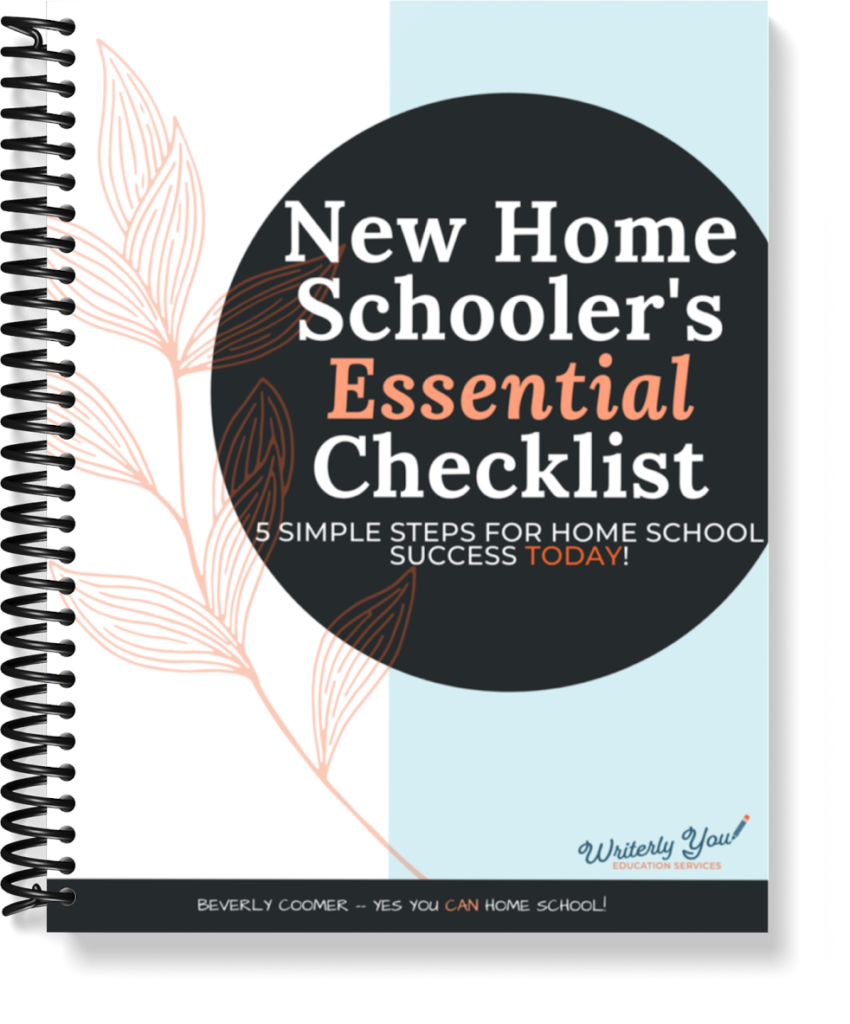10 Home Schooling Confidence-Stealers and How to Stop Them in Their Tracks

When you brought your children HOME for school, did you suddenly start hyperventilating?! Or did you hear a voice in your head screaming, “Are you CRAZY?? What do you think you’re doing?! You can’t POSSIBLY teach your own children!!”
Don’t worry, mama — you’re not alone! We all worry about whether we have what it takes to provide the high-quality education we’ve always wanted for our children. And we’re pretty sure we’re the only ones who feel this way.
Ready to home school?
Not sure where to start?
Sign up to get the New Home Schooler’s Essential Checklist. It’ll help you navigate the first steps of your home education journey simply, effectively, and stress-free.

Top 10 Confidence-Stealers
Just like you, most home schoolers have wondered about the decision they made when they first started. And just like you, they had a LOT of fears that threatened to strip them of any confidence they may have had when they first considered bringing their children home for school. In fact, here’s a list of 10 Top Home Schooling Confidence Stealers — and How to Overcome Them:
“I’m not good enough for this.”
Has any mama, ever, felt like she was ‘good enough’ to be the mother her children needed her to be? As nurturers, we come by our insecurity naturally, but we must remember that if the LORD put it in us to do, then He will provide a way for us to do it. You ARE good enough, because HE is good enough! And He will guide you as you step into this responsibility with faith that He has a marvelous plan for you and your children!
“Am I capable to teach my own children?”
The short answer is ‘yes’. The slightly longer answer is that regardless of whether you are teaching your six-year-old to read or you are tutoring your high schooler in chemistry, you only have to be ONE PAGE AHEAD of them! The truth is, we are actually learning right along with our children, and we have a wonderful opportunity to model a heart of wonder and willingness to learn. You don’t really have to be capable; you only need to be willing.
Ready to home school?
Not sure where to start?
Sign up to get the New Home Schooler’s Essential Checklist. It’ll help you navigate the first steps of your home education journey simply, effectively, and stress-free.

“Will my children actually learn?”
Here’s the deep, dark secret, mama: no one can teach a child (or anyone else, for that matter) anything he or she does not WANT to learn!
Sounds strange, right? But think about it; when you were in school, you probably studied for lots of subjects in order to get a good grade or pass a test — but did you LEARN it? Did you study because it interested you?
And if your child has just come from that same public school system that insisted a ‘good education’ meant passing tests, getting good grades, and going to college, they may just tell you that they hated every minute of it, couldn’t care less about most of what they had to study, or don’t really remember much of it. If they did enjoy some of it, they probably were interested in the information already and found value in pursuing it further.
So the bottom line is, yes, they will actually learn, because you have the freedom to tailor every subject to their interests, bents, and abilities. And you’ll be able to pivot fast when change is needed.
Ready to home school?
Not sure where to start?
Sign up to get the New Home Schooler’s Essential Checklist. It’ll help you navigate the first steps of your home education journey simply, effectively, and stress-free.

“But what about ‘socialization’?”
This was probably the very first question most home educating parents were asked when homeschooling began to gain traction many years ago. And it’s still a question people don’t know how to answer.
First, define your terms: what IS socialization? To whom do you want your children to be socialized — to people of all generations and walks of life and your own family, or to strangers who often do not have your children’s best interests at heart, or to dangerous social cliques of similarly aged children who tend more toward foolishness than toward truth, courtesy, and compassion?
Second, consider that raising children in a loving two-parent home with good conversation, good books, carefully chosen friends, and high standards for behavior does more to prepare a child for maturity and independence than unnaturally age-segregated school classrooms and activities.
That’s not to say that sports and other extra-curricular activities can’t be productive and fruitful; just be sure to ‘vet’ those who will be in authority over your child, and encourage your child to speak and act in ways that match up to your family’s values.
“Schedules are too hard to keep.”
It’s easy to think that a ‘proper’ education means dedicating as many hours at home as the public school allows for class time. But remember — home schooling is a one-on-one tutoring environment, so time spent with your child will be more productive and he will be engaged in legitimate learning, not administrative details.
Give yourselves grace to enjoy the journey. If it starts to be a burden to ‘get everything done’, consider reducing the amount of study time you are requiring. Shorter time blocks of focused, intense effort will generate better progress and greater learning!
Ready to home school?
Not sure where to start?
Sign up to get the New Home Schooler’s Essential Checklist. It’ll help you navigate the first steps of your home education journey simply, effectively, and stress-free.

“Which curriculum is best? What if I pick the wrong one?”
Hint: it’s not about curriculum. The tools you use to accomplish your goals will vary according to your child, your own learning and teaching style, interests, time, and value. And the tools come in all shapes and sizes; books, study guides, projects, hands-on and hands-in activities, community organizations, service organizations, etc.
Use the tools that will help you rest in the knowledge that your children are learning to learn, are gaining in wisdom and knowledge, and are making appropriate educational progress.
Honestly, if all you do is read every day, write every day, and practice mathematics every day, you’ll accomplish more than traditional school models can possibly achieve, and your children will have time to develop their own interests and get excited about what they can learn!
“How do we convince our family that we’re not crazy?!”
Now, there’s a loaded one! While results will speak volumes to family members who are skeptical that anything but a traditional classroom can be considered ‘education’, remember that most of us are still products of the public school system, so it may be the only thing many people know. Thank your family members, friends, or acquaintances for their concern, assure them that you are covering ‘the basics’ — reading, writing, arithmetic, history, science — and give them examples of some of the benefits your family has experienced in your new education paradigm.
For instance, maybe your formerly shy child is coming out of her shell as she recognizes that her ideas are valued and respected. Perhaps your son is finally getting a handle on math that he wasn’t getting help with from an overworked teacher. Or it could be that your children are learning compassion as your family volunteers to serve others in your community — because now you have TIME to do it!
Help your family and friends to see the blessings and benefits of home learning that they might have never considered before; soon they, too, will be praising your decision!
Ready to home school?
Not sure where to start?
Sign up to get the New Home Schooler’s Essential Checklist. It’ll help you navigate the first steps of your home education journey simply, effectively, and stress-free.

“I can’t be both Teacher and Mom.”
When we brought our oldest daughter home for school after a disastrous third-grade year in public school, I found myself in uncharted waters, wondering what we’d done and how I could possibly figure out where to start. How would I teach her what she needed to know? What if I failed? What if my children became social misfits?!
What if I just. couldn’t. keep. up?
I wondered if I could ever get it together and be the mentor my children needed me to be – and still be Mom at the end of the day. But as I began my own re-learning process, I learned some valuable lessons.
First, learning happens best when a child wants to know and can express curiosity and creativity.
Second, our family didn’t have to be like every other family; in fact, we all were unique individuals, created with love and intention and created for a purpose. If this was my purpose, then I could rest, knowing that I was doing what I was supposed to do.
Third, I had been teaching my child since she was born, and this was no different. Because I loved her more than any teacher could, I had the ability to teach from a heart of love and understanding. And isn’t that a mama’s heart, anyway?
Be patient as you learn how to find your children’s best learning styles, as well as your own. Encourage them as they struggle to get used to this new learning environment. Let go of the fear and worry that threatens to steal your joy as the mother of your children. Invest in your children, and they will repay you many times over!
“Will home schooling prepare my children for advanced education?”
Don’t worry; as multiple education researchers are discovering, home educated children from every social and economic level are outperforming their public school peers in practically every academic and social assessment. Colleges and universities are eager to accept home schoolers, and are changing their admissions requirements to reflect their experience — turns out home educated students are just plain better academic and financial bets than many traditionally educated students!
Ready to home school?
Not sure where to start?
Sign up to get the New Home Schooler’s Essential Checklist. It’ll help you navigate the first steps of your home education journey simply, effectively, and stress-free.

“I can’t teach my child to read!”
Yes, you can.
Begin with providing a print-rich learning environment. Read aloud to your children every day. Make the library a regular part of your weekly or monthly schedule, and let your children select books that interest them.
[But PLEASE preview every book your child wants to read, and never be afraid to reject something you think may be detrimental to his developing character. It’s your job, after all, Mama Bear.]
Practice recognizing letters, as well as the sounds they make. Use kinetic activities (sand, beans, rice, etc.) to have them practice writing the letters as they learn them. Once they are familiar with letter shapes and sounds, you can move into a more structured reading program if you still don’t feel confident that they will get it. But they will. Just give them time.
And don’t be in a hurry. There’s no set age when a child is developmentally ready to read, as all children mature at different rates. Reading is a life skill that’s worth taking time to teach well, and allowing your child the time to learn well.
If you want a suggestion for a parent-and-child-friendly easy start to reading, check out Ruth Beechick’s “Three R’s” — three lovely little booklets (now in one volume) that will give you a strong start in reading, writing, and arithmetic for 5-to-9 year-olds. It really is easier than you think, as long as you let go of deadlines and unrealistic expectations.
Ready to home school?
Not sure where to start?
Sign up to get the New Home Schooler’s Essential Checklist. It’ll help you navigate the first steps of your home education journey simply, effectively, and stress-free.

Homeschooling is Messy
From fears that you’re not good enough, to concerns about socialization, to worrying about developing fluent readers, you can sometimes feel pressure from all sides to do everything perfectly. But that’s just not real life.
Home schooling will be messy. It will be uncomfortable. It will be frustrating and confusing.
But you will also experience the joy and pleasure of being right there alongside your children, watching them grow, learn, discover, as they are allowed the freedom to experience life together with you.
Practice setting aside your preconceived notions of what education is ‘supposed’ to look like, and embrace the confidence that comes from trying new ideas and finding what works for you and your children. As you take small steps consistently over time, your path will become clearer. Give yourself permission to let go of the fear and worry that you don’t have what it takes. Because you do.
You’re a Mama. You love your children.
You’ve got this.


